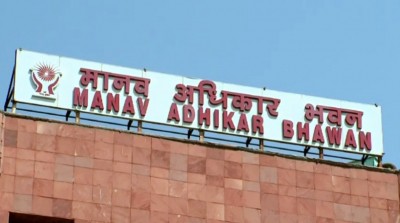By Hitesh Tikoo
Jammu, Dec 23 : The National Human Rights Commission has summoned Jammu and Kashmir Chief Secretary, B. V. R. Subrahmanyam, over administration’s insensitive approach to Rajinder Premi’s case.
Rajinder Premi, a Kashmiri Pandit migrant, has been long requesting the government of India to rename the local high school, higher secondary school, block health centre, district library at Anantnag, and a road after his late father, Sarwanand Koul Premi.
Sarwanand Koul Premi, a renowned poet, social activist, journalist and reputed author of about three dozen books, who along with his younger son, late Virendra, then aged 27 years, was kidnapped by terrorists from their ancestral home in Kashmir and killed in 1990.
The complainant (Rajinder Premi) has stated that the terrorists ransacked the family’s entire house and looted everything, leaving them destitute. The incident was a severe blow to the belief of the family, and they were forced to leave Kashmir much against their wishes, leaving everything behind.
It is also stated that the family’s two native residential houses along with a cow-shed were burnt down by the terrorists in1998 and their ancestral immovable property, including agricultural field was trespassed and grabbed by local land mafia.
The National Human Rights Commission had earlier taken cognizance of the complaint made on August 30, 2020 and had observed and directed as under — “It is amply clear that the main grievance of the complainant is the non-implementation of the State Human Rights Commission’s judgment and order dated February 22, 2012 and since the SHRC is ceased to have any existence due to abrogation of Article 370 and introduction of Jammu and Kashmir Reorganization Act 2019, the complainant has came before the National Human Rights Commission with a prayer that Commission may intervene immediately for getting order implemented passed by the SHRC”.
Premi had approached the Commission in 2008 and based on his complaint, a case number 119/1/08-09/OC was registered which was disposed of vide order dated July 20, 2008 by transferring the complaint, being a state subject matter, to Jammu and Kashmir State Human Rights Commission. The SHRC had instructed the government to submit a report within two weeks.
The SHRC of Jammu and Kashmir heard the case for four years and finally on February 22, 2012, its division bench passed a reasoned order, covering almost all aspects of the complainant’s grievances, and had made very valid recommendations and directed the Jammu and Kashmir government to redress the concerns of the complainant’s family.
The commission had stated, ”The Commission is of the opinion to issue notice to the Chief Secretary, Union Territory of Jammu & Kashmir asking him as to why full relief should not be granted to the complainant in terms of judgment and order of the erstwhile State Human Rights Commission of Jammu & Kashmir vide order dated 22.02.2012, within four weeks.”
”The Commission observes that despite direction, the Chief Secretary, Union Territory of Jammu & Kashmir has not submitted any report till date.”
The NHRC has now summoned the Jammu and Kashmir Chief Secretary, B. V. R. Subrahmanyam.
The complainant had also stated the cost of looted property at Rs 10,00,000 (ten lakh) against which an ex-gratia of Rs1,00,000 for each life lost was paid by the state government.
Documents accessed by IANS revealed that in 2001, the then Prime Minister, Manmohan Singh, had assured Premi’s family of fulfilling their demands and also endorsed their request to open a sports stadium and a tehsil level library in Kokernag after Rajinder Premi’s late father Sarwanand Koul Premi’s name. However despite repeated assurances, none of the promises made have been translated into action till date.
Rajinder Premi told IANS, ”This continued callous attitude of the government is not only an utter disregard to the SHRC, but also an insult to the family of a martyr, who has also been a victim of denial, discrimination and deprivation too”.
”31 years on, our wounds are still dry, will they heal anytime?”, Premi added.
Disclaimer: This story is auto-generated from IANS service.

